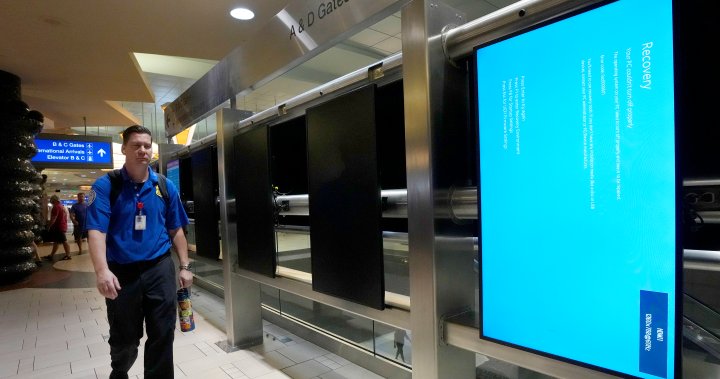A recent string of cyberattacks and outages across various industries has highlighted the vulnerability of our reliance on big tech companies and single brands. From airlines to banks to car dealerships, customers have faced difficulty accessing services due to faulty updates, cyberattacks, and system shut-downs. The impacts of these incidents have underscored the interconnected nature of our global economy and the importance of having robust cybersecurity measures in place. This wake-up call has prompted experts to emphasize the need for companies to have contingency plans and backups in order to prevent similar disruptions in the future.
One of the recent incidents involved a faulty update from cybersecurity firm CrowdStrike, which led to thousands of flights being cancelled, delays at hospitals, and disruptions in payment systems at banks. This error highlighted the critical role that single systems and software can play in the functioning of businesses and the potential risks associated with such dependencies. The incident also exposed the vulnerability of our technology infrastructure and the need for increased vigilance in safeguarding against cyber threats. Experts warn that incidents like these serve as a reminder of the importance of cybersecurity and the potential consequences of a single error on the global economy.
Delta Air Lines was among the companies affected by the recent cyberattacks and outages, leading to significant cancellations and disruptions. Despite efforts to restore operational reliability, the airline still faces investigations by regulatory authorities to ensure compliance with laws and protection of passenger interests. Lisa Plaggemier, executive director of the National Cybersecurity Alliance, highlighted the inherent insecurity of the internet and the need for businesses to have business continuity plans in place. Such plans can help companies mitigate the impact of cyber incidents and ensure the continuity of their operations during disruptions caused by human error or external factors.
In response to the incidents, some companies, like car dealerships affected by the CDK cyberattack, resorted to manual processes using pen and paper to keep the business running. This improvisation during times of crisis underscores the importance of having contingency plans and alternate systems in place to address disruptions effectively. The need for backups and alternative systems is crucial to prevent reputational damage, financial loss, and operational downtime in the event of cyber incidents. Companies are urged to invest in cybersecurity measures and disaster recovery strategies to mitigate the risks associated with cyber threats and system vulnerabilities.
Experts emphasize the importance of having backups and alternative systems in place to address disruptions caused by cyber incidents, human error, or external factors. Javad Abed, professor of information systems at Johns Hopkins University, underscores the need for preventative measures to avoid future crises and the significant consequences they can have on different sectors. While implementing alternative systems may be more expensive, it is deemed necessary to prevent potential crises and safeguard against cyber threats. Alex Hamerstone, advisory solutions director for TrustedSec, warns of the interconnected dependencies in our technology infrastructure that can be exploited by hackers or affected by unforeseen events, necessitating a proactive approach to cybersecurity and business continuity planning.
Overall, the recent cyberattacks and outages across various industries have highlighted the vulnerabilities in our technology infrastructure and the interconnected nature of our global economy. Companies are urged to invest in cybersecurity measures, backups, and alternative systems to prevent disruptions and mitigate the risks associated with cyber threats. The incidents serve as a wake-up call for businesses to reassess their reliance on big tech companies and single brands, and to implement robust contingency plans to ensure the continuity of their operations during times of crisis. These incidents underscore the importance of proactive cybersecurity measures and the need for collaborative efforts to address the evolving threats in the digital landscape.


